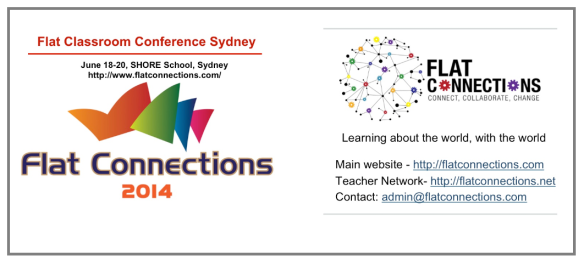The Facing IT group on Facebook http://www.facebook.com/groups/facingit/members/#!/groups/facingit/ is an open group managed by Australian educators for anyone facing up to the challenges of using information technologies for communicating, teaching and learning.

I have found the group very helpful and encouraging particularly when group members are participating in online courses and sharing the learning and the problems encountered.
I have received helpful advice about how to create canvas textured images and which browser is most useful for certain tasks.
So I was really delighted when Penny Bentley addressed this question to me

The first part of the question was easily answered


Then I noticed the phrase ‘using a persona’ and felt I needed to qualify my answer

I am not sure whether it could be said that I use a persona. I write as myself but I illustrate Sprite’s Site blog with a cast of characters with whom I interact. The main character is Sprite a student who is both gifted and also has some form of learning disability or difference. Sprite is described here http://spritessite.wordpress.com/about-2/ and the other characters are described here http://spritessite.wordpress.com/about-the-characters/
Or is there another meaning of the term persona that I have not yet encountered?

After that the exercise became even more complex!
I read Penny’s excellent blog post at http://penbentley.com/2013/02/01/oldsmooc-asleep-at-the-wheel-of-a-a-pdf/
I watched the video clip and suddenly realised that the Dabrowski Dogs (except Psycho Motor, who was off somewhere bouncing and barking,) were watching it with me. The presentation certainly engaged my senses and emotions as well as my intellect and made the explanation of the mathematics behind the video at http://www.etereaestudios.com/docs_html/nbyn_htm/about_index.htm so much more meaningful.

I had a brief look at the 17 page PDF found at http://dbis.rwth-aachen.de/~derntl/papers/preprints/ijel2010-vidl-preprint.pdf
And I stalled for time for commenting and answering the question


I provided a link to a collection of Education topics on Gifted Resources website which could be useful particularly the maths and science lists

But I was not really sure whether that was the type of information Penny was seeking. Was she looking for sites which offered inspiring video clips like the one she had posted or sites which contained a wealth of information about mathematics and science? Did she want interactive maths manipulatives? Would infographics creators be useful? Would she like some examples of programs or did she only want the materials for building her own course?

With Intellectual and Imaginational Dabrowski now playing tug-of war with the question and pulling it towards many variations of answers I wondered whether I should include some references which I thought might be interesting?/relevant?/ maybe provide a springboard for her such as World builders http://www.world-builders.org/
I wondered whether she would be interested in the Abundance: Count your blessings program I wrote for church school which used nature videos to start discussions about vast numbers in nature on every scale from the tiny to the immense (It can be found about half way down the page at http://www.giftedresources.org/jo/churchschoolprograms.htm )

The second part of Penny’s question had me reaching for the mindmap program.

My answer would be that in general gifted students thrive on material that is at a higher level and delivered at a faster pace and greater depth and with fewer repetitions than the average student of their age.
However I would also say that gifted students are not a homogenous group
George Betts and Maureen Neihart have compiled and recently revised Profiles of the Gifted and Talented
http://www.ingeniosus.net/wp-content/uploads/2010/11/PROFILES-BEST-REVISED-MATRIX-2010.pdf
As well as different levels of giftedness they can have different learning styles and preferences, different sources of motivation, differing levels of autonomy in their learning and differing degrees of creativity and innovation.
The Columbus Group Definition of Giftedness
Giftedness is asynchronous development in which advanced cognitive abilities and heightened intensity combine to create inner experiences and awareness that are qualitatively different from the norm. This asynchrony increases with higher intellectual capacity. The uniqueness of the gifted renders them particularly vulnerable and requires modifications in parenting, teaching and counselling in order for them to develop optimally.
(The Columbus Group, 1991)
Bearing in mind the Columbus Group definition of giftedness as asynchronous development and heightened sensitivity I would add that teaching which engaged gifted students senses, emotions, imaginations and spirituality would be particularly effective.
I am not sure whether that answers the question!
 I attended the first OZeLIVE Conference http://australianeducators.ning.com/ It was held 0n 22-23 February 2014 at times which were friendly for most Australian states (it was an early start for the Western Australians). Steve Hargadon and Coach Carole had set up a wonderful framework Ning and Blackboard Collaborate rooms and Shamblesguru, Anne Mirtschin and others provided tutorials and advice to help with participation Syba Academy http://www.sybaacademy.com/learning/academy-home sponsored the event It was an exciting time with lots of great feedback and reflections, people we met, lessons we learned and connections we made from:
I attended the first OZeLIVE Conference http://australianeducators.ning.com/ It was held 0n 22-23 February 2014 at times which were friendly for most Australian states (it was an early start for the Western Australians). Steve Hargadon and Coach Carole had set up a wonderful framework Ning and Blackboard Collaborate rooms and Shamblesguru, Anne Mirtschin and others provided tutorials and advice to help with participation Syba Academy http://www.sybaacademy.com/learning/academy-home sponsored the event It was an exciting time with lots of great feedback and reflections, people we met, lessons we learned and connections we made from: http://www.flatconnections.com/ http://www.flatconnections.com/flat-projects.html http://globalclassroom2013-14.wikispaces.com/ http://youthvoices.net/live http://www.nmc.org/publications/2013-horizon-report-k12 http://popplet.com/ http://edorigami.wikispaces.com/
http://www.flatconnections.com/ http://www.flatconnections.com/flat-projects.html http://globalclassroom2013-14.wikispaces.com/ http://youthvoices.net/live http://www.nmc.org/publications/2013-horizon-report-k12 http://popplet.com/ http://edorigami.wikispaces.com/  Nancy White Liberating structures
Nancy White Liberating structures  http://www.liberatingstructures.com/ http://www.liberatingstructures.com/15-improv-prototyping http://onlinefacilitation.wikispaces.com/Visual+Work+and+Thinking Penny Bentley Open education resources
http://www.liberatingstructures.com/ http://www.liberatingstructures.com/15-improv-prototyping http://onlinefacilitation.wikispaces.com/Visual+Work+and+Thinking Penny Bentley Open education resources  http://search.creativecommons.org/ http://whyopenedmatters.org/videos/ http://www.opened.io/ http://www.oercommons.org/ http://coolstem.wikispaces.com/home-
http://search.creativecommons.org/ http://whyopenedmatters.org/videos/ http://www.opened.io/ http://www.oercommons.org/ http://coolstem.wikispaces.com/home-













